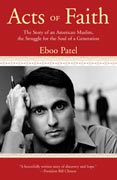
"I am a Muslim. This is what Muslims do."
Did your mind go negative? Possibly. So pervasive are misgivings about Muslims in America today that it is difficult to avoid religious prejudice. One remedy is to read Dr. Eboo Patel's remarkable autobiography titled: "Acts of Faith," released this year by Beacon Press.
"Acts of Faith" is Patel’s personal story of growing up in the suburbs of Chicago as a second generation Muslim immigrant from India. In many ways it is the same American story that has been told by generations of immigrants who struggle with the competing claims of inherited, adopted and innate identities. As Mr. Patel informs the reader in the introduction: "I am an American Muslim from India. My adolescence was a series of rejections, one after another, of the various dimensions of my heritage in the belief that America, India, and Islam could not co-exist within the same being."
In "Acts of Faith," we follow Patel as he moves from his goal of assimilation to a desire to erase his heritage in his "American" (read white, Christian) atmosphere in high school, to angry pride and radical politics in college, to a resolution of an integrated life. This journey calls upon all of his identities to create that which is an important, if seldom recognized, reality in America in the 21st century: The fully Muslim and fully American person.
There are several strings that wind through the story, including his relations with women of different religious backgrounds (like Jewish and Mormon); his interest in the radical politics of black power; and most interestingly his inspiration from religious figures outside his own faith as diverse as Gandhi, the Dalai Lama and perhaps most influentially Dorothy Day and the Catholic worker movement. However, the book's spiritual high point is not with any of these celebrities, but rather with a Muslim woman in India who harbors women caught in abusive relationships and have nowhere else to go. That woman is Patel's grandmother, and in a moving exchange he recounts his nervousness about his grandmother, whom he observes taking in a strange woman who has appeared at her door:
He writes:
"I couldn’t restrain myself: 'Mama, this is crazy. You can just take strange women into your home and keep them here for weeks or months. This isn't the underground railroad, you know. You're old now. This is dangerous.'
'Crazy, huh?' She responded. How old are you?'
'Twenty-two.'
'I have been doing this for forty-five years. That’s more than twice as long as you have been on earth.' …
'Why do you do this?' I finally blurted out.
She looked a little shocked that I would ask, as if to say that the answer was self evident. But just in case it wasn't clear to me, she said simply, 'I am a Muslim. This is what Muslims do.'"
But not all Muslims. Nothing is more chilling than Patel's fictional recounting of how easy it might have been to have been seduced by radical ideology when he was young and alienated as so many young people currently are--and not only young people in Islam, but in Christian separatist movements such as the one that influenced Eric Rudolf as well as Jewish and Hindu extremists. In a chapter titled "Youth Programs" Patel describes the history and evolution of extremists in his own faith and how persuasive these groups can be. In speaking about Osama Bin Laden, Patel makes the particularly salient point that Bin Laden is, if nothing else, a brilliant youth organizer.
But so is Eboo Patel. In 2002, after completing a doctorate at Oxford on a Rhodes Scholarship, Patel started a non-governmental organization called the Interfaith Youth Core (IFYC) with the mission of providing a vaccine against extremist anti pluralist movements by introducing young people of all religious faith to one another in a safe and productive environment. IFYC's growth is chronicled in the book. From its humble beginnings with two employees, the group has ballooned to a staff of 25 people. IFYC's first national meeting of interfaith youth workers attracted 30 young people and adults sitting in a circle discussing their work. Five years later, a video-taped greeting from former President Bill Clinton opened the conference, as 600 young people gathered from across America and even internationally to attend symposiums on pretty much any subject one could imagine.
W.E. Dubois said that the question of race will define the 20th century. Eboo Patel is convinced that how we deal with religious differences will define the 21st century. "Acts of Faith" is a well written, compelling testimony to how one man is trying to ensure that different religions can live side by side in peace.
And why does he do it? Because this is what this Muslim does.

